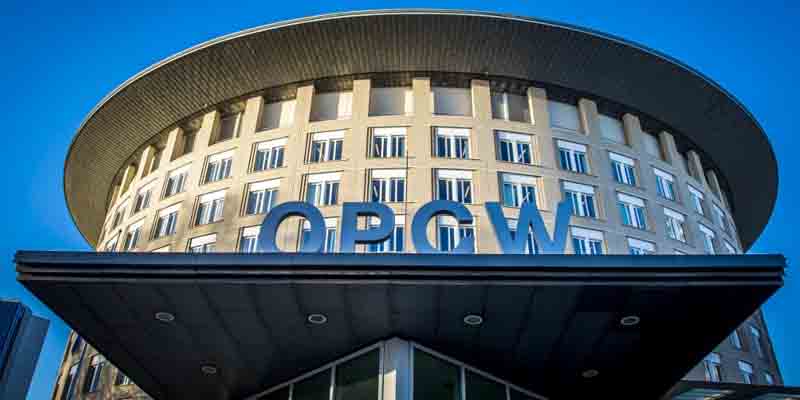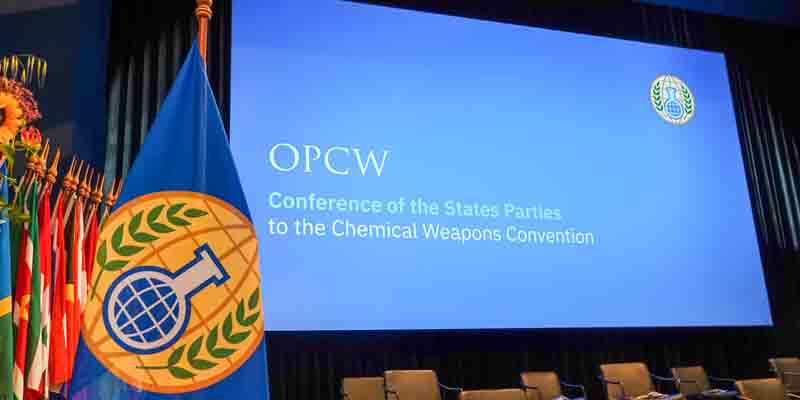- World
- Dec 07
What is the purpose of OPCW?
• Fernando Arias was re-appointed as the director-general of the Organisation for the Prohibition of Chemical Weapons (OPCW). The decision was made at the 26th Session of the Conference of States Parties to the Chemical Weapons Convention.
• Arias has served as OPCW director-general since July 2018. Prior to his appointment as director-general, he served as the ambassador of Spain to the Netherlands, as well as Permanent Representative of Spain to the OPCW. The second term of Arias will begin on July 25, 2022 and end on July 24, 2026.
• Pakistan has been re-elected to the Executive Council of OPCW for the term 2022-2024.
Organisation for the Prohibition of Chemical Weapons
• The Organisation for the Prohibition of Chemical Weapons (OPCW) is the implementing body for the Chemical Weapons Convention, which entered into force on April 29, 1997.
• The OPCW’s mission is to implement the provisions of the Chemical Weapons Convention to achieve our vision of a world free of chemical weapons and the threat of their use, and in which chemistry is used for peace, progress, and prosperity.
• Its headquarters is situated at The Hague, Netherlands.
• India is a signatory and party to the Chemical Weapons Convention (CWC). OPCW has selected India’s Comptroller and Auditor General (CAG) as its external auditor for a three-year term starting in 2021.
• The Convention is a universal, non-discriminatory, multilateral, disarmament treaty which prohibits the development, production, stock-piling and use of chemical weapons and monitors its elimination in order to secure a world free of chemical weapons.
• It also supports the scientific and economic development of its Member States in the peaceful uses of chemistry.
Functioning of OPCW
• The OPCW, with its 193 Member States, oversees the global endeavour to permanently and verifiably eliminate chemical weapons.
• As the principal and plenary organ of the OPCW, the Conference of the States Parties oversees the implementation of the CWC, promotes its goals, and reviews compliance with the treaty. It also oversees the activities of the Executive Council and Technical Secretariat.
• The Executive Council consists of 41 OPCW Member States that are elected by the Conference of the States Parties and rotate every two years. The Council supervises the activities of the Technical Secretariat and is responsible for promoting the effective implementation of and compliance with the Convention.
• The Technical Secretariat assists the Conference of the States Parties and the Executive Council in performing their tasks and carries out the Chemical Weapons Convention’s verification measures. It also carries out other functions entrusted to it under the Convention as well as those functions delegated to it by the Conference and the Council.
• The Conference of the States Parties meets annually in The Hague to assess the implementation of the CWC and to make key decisions regarding the future work of the Organisation.
• The Conference of the States Parties oversees the continued implementation of the CWC, the promotion of the treaty’s objectives and reviews international compliance with the treaty.
• Since the Convention’s entry into force in 1997, it is the most successful disarmament treaty eliminating an entire class of weapons of mass destruction.
• Over 98 per cent of all declared chemical weapon stockpiles have been destroyed under OPCW verification.
• The 2013 Nobel Prize for Peace was awarded to OPCW for ‘its extensive efforts to eliminate chemical weapons’.
Manorama Yearbook app is now available on Google Play Store and iOS App Store


